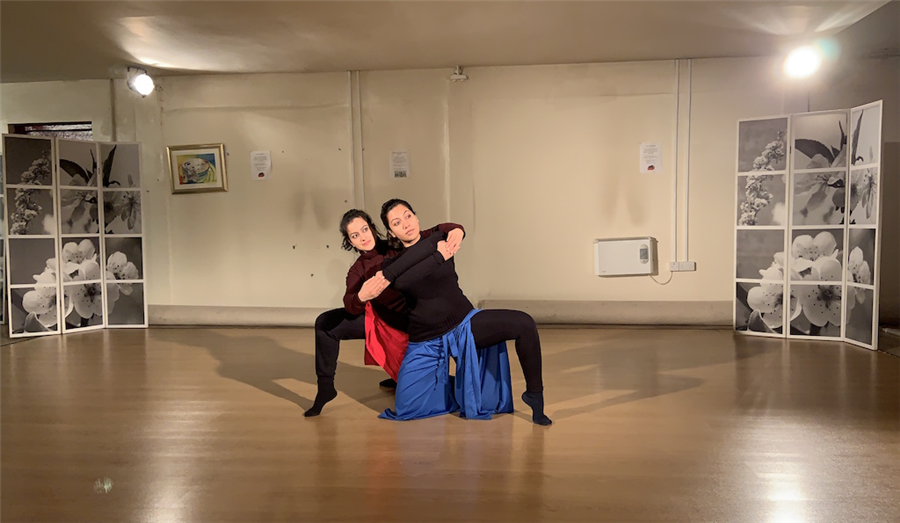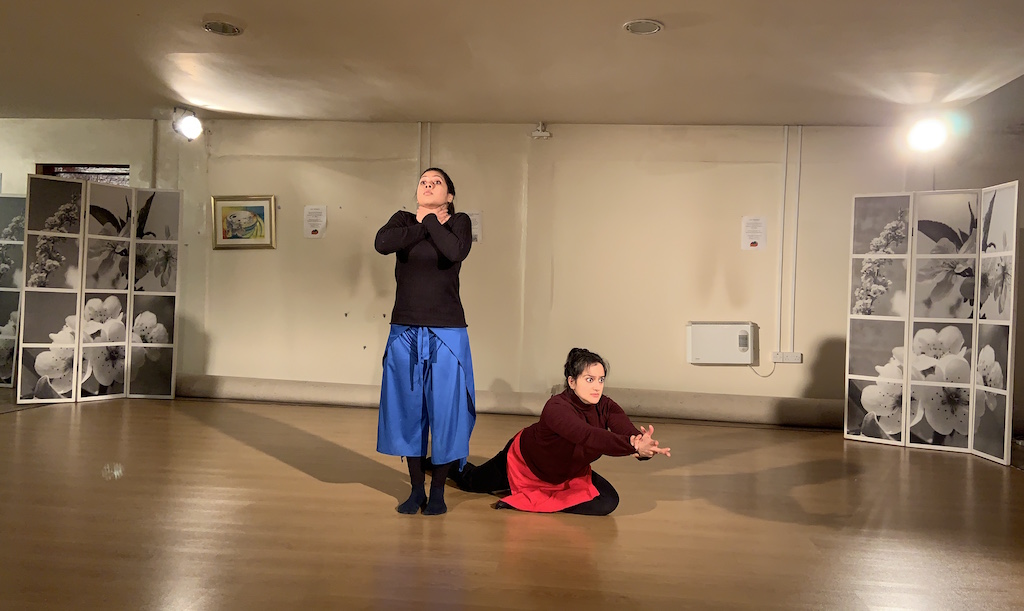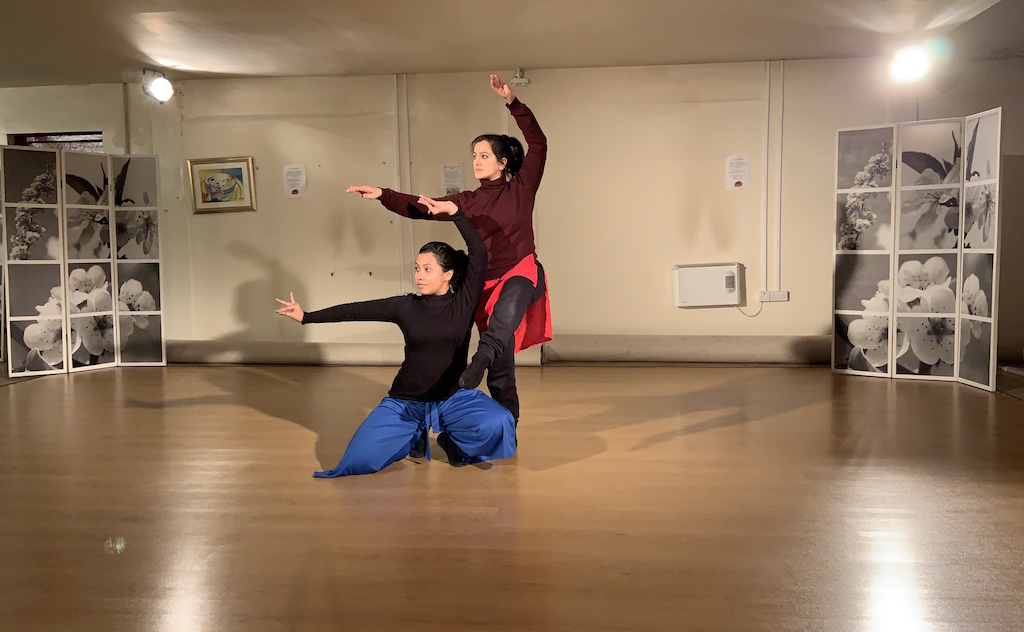- Home
- News
- Sonia Sabri Company to perform international dance production at Birmingham Museum & Art Gallery
Sonia Sabri Company to perform international dance production at Birmingham Museum & Art Gallery
25 February 2020

Main image: Sonia Sabri (left) with Bangladeshi dancer Arthy Ahmed from the Shadhona Cultural Circle in Dhaka, during rehearsals
Sahasa is a free dance and live music work-in-progress piece which is the beginning of a unique international collaboration of female artists from Birmingham and Bangladesh supported by Transforming Narratives
Open Rehearsal
Friday 28 February at 2.30pm – 4.30pm
Free drop in event, in the Round Room, Birmingham Museum & Art Gallery
This is an opportunity to see Sahasa in its creation phase as part of a unique open rehearsal
Sharing Event and Informal Post Show Chat
Saturday 29 February
12pm-1pm and 2pm-3pm with a Q&A following each performance, taking place in the museum’s Gas Hall
The events are free but pre-booking is recommended for the Sharing and Informal Chat events on Saturday 29 February. Book here.
Sonia Sabri Company has teamed up with Bangladeshi dancer Arthy Ahmed from the Shadhona Cultural Circle in Dhaka, who has travelled to Birmingham and England for the first time to perform Sahasa at Birmingham Museum & Art Gallery.
The Birmingham-based Sonia Sabri Company is one of the leading contemporary South Asian dance and music companies in the UK and has an international reputation for presenting Kathak dance in a contemporary context.
Sahasa, which means The Brave, continues one of the award-winning company’s strands, which is female empowerment and this new research and development project focuses on women’s stories, particularly from the Bengali community of the UK and cities in Bangladesh.

This is Arthy Ahmed's first time in England and will perform Sahasa with Sonia Sabri (right) at Birmingham Museum & Art Gallery
Last April Sonia Sabri travelled to Dhaka as part of a research and development trip supported by Transforming Narratives, where she visited various organisations and connected with women from different backgrounds.
The concept was to research the experiences of women from communities in Bangladesh and see whether it made a difference to be born and bred there or to be born or emigrated to Birmingham and how much women’s experiences, opportunities and challenges were shared.
“We are looking at creating a piece which is stimulated from some of the conversations from interviews I have conducted with women from both countries,” said Sonia.
While in Bangladesh she visited an organisation called Naripokkho, which gives refuge to women from challenging backgrounds and through art and literature it restores their confidence by enabling them to find jobs and get back on their feet.
The women shared their stories with Sonia and the organisation told her how it has lobbied the government to make positive changes to women’s rights in Bangladesh.
“We are not here to back anyone’s particular story but reach a consensus, which says ‘look, these are the challenges or the teachings we should be passing on to the current generation if not the future generation of women and men’,” she says.
“But mostly Sahasa is based on how women need to support women because from the conversations I’ve had, unfortunately, that’s what’s missing from the jigsaw.”
She says Sahasa mirrors the aims of the Transforming Narratives project as it attempts to engage more Pakistani and Bengali communities through art and gives them an opportunity to share their views.
Transforming Narratives is a project to establish Birmingham as a global centre for contemporary arts from Pakistan and Bangladesh. The three-year project, established in 2018, is bringing together artists and cultural organisations from across artforms, who are located in Birmingham and cities in Pakistan and Bangladesh.
Sonia says that Sahasa is not a full production but actually the start of what she envisages will be an international touring production of dance and music in the future and is looking forward to hearing the audience’s reaction.
As part of the two-day event there will be three musicians performing, including Sonia’s husband and director of the company, Sarvar, an internationally renowned tabla player and composer, who has created the musical score.

Sonia and Arthy will also perform short solos to give the audience an understanding of their different styles of kathak and bharatanatyam respectively before the performances of Sahasa.
On Friday 28 February there will be a unique chance to see an open rehearsal in the museum’s Round Room and the following day there will be two performances of Sahasa each followed by a question and answer session where the company wants to encourage the audience to engage around the topic of how women are supporting each other.
“This is something we want to address and something we want to share,” says Sonia. “And we are doing this through music and dance, and we hope to engage with women that perhaps have never seen art in this way.
“Art can be used as a seed for change and not just about entertainment – we now have scientific research to prove art very therapeutic for our emotional and mental wellbeing but we want to go beyond that and use art to interrogate and allow people to voice the concerns they have so as a project it goes beyond what just words can achieve.”
She also says this is not a topic just for Bengali women but is a universal issue and wants to encourage as wide an audience as possible.
“We know from the #metoo movement there is an underlying problem that needs to be addressed.
“The women I met in Bangladesh were much more forward thinking, much more courageous than maybe their counterparts are here. So while the ideology is that the western world is more forward thinking that is not always the case.
“Sometimes the diaspora is living the life that it left behind, and that life has moved on, it’s progressed.”
The events are free but pre-booking is recommended for the Sharing and Informal Chat events on Saturday 29 February. Book here.
← Read other news articles